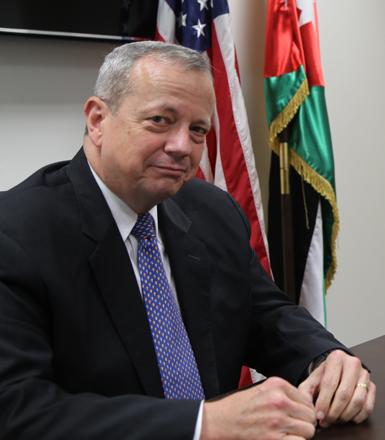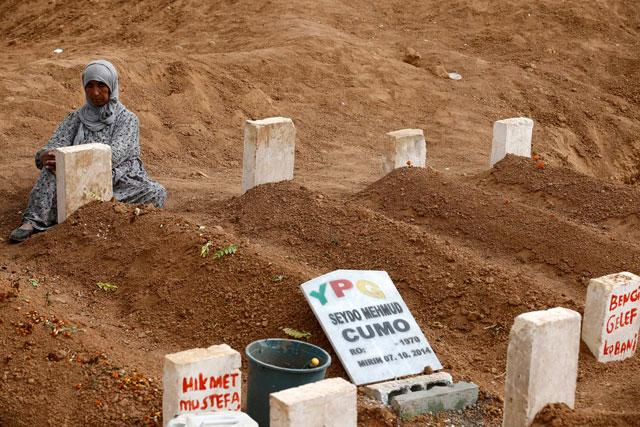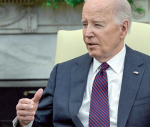You are here
Russian intervention in Syria only meant to rescue Assad — Allen
By Omar Obeidat - Oct 07,2015 - Last updated at Oct 07,2015

General John Allen
AMMAN – The Russian intervention in Syria is only meant to rescue Bashar Assad’s regime from collapse and not to fight terrorists, said US Special Envoy for the Global Coalition to Counter Daesh General John Allen.
In an interview with The Jordan Times and Al Rai dailies on Monday, Allen said the recently launched Russian operations in Syria would not push the coalition to scale back its airstrikes against Daesh in Syria, calling on Moscow to join the international community in committing itself to a political transition in Syria as soon as possible.
"The sense that Russians have played a strategic role in the region, I think is eclipsed by the reality that the Assad regime was in serious trouble. He was in trouble from a whole variety of reasons and what we see here is that the Russians are intervening to keep a client from collapsing," he said, adding that while the Russians are saying they have intervened to fight Daesh, the truth is they intervened to fight everyone "and that is a problem."
Allen, who was on a visit to Amman during which he met with His Majesty King Abdullah and top military and government officials, said what the international community has hoped for was that Russia participates in a process of political transition that puts the government of Syria in the hands of the Syrian people, with Assad not included.
But as the Russian intervention in the Syrian crisis has created new operational realities, Allen said, the US is attempting to understand these realities and adapt accordingly.
The retired general, however, stressed the importance of not framing what is happening in the region as a potential proxy war between the US and Russia.
"The US has been clear; the coalition has been clear that our goal is to defeat Daesh as an entity because it is a threat to all of the region and us. But at the same time, as we are doing that, our policy objective is turning the government of Syria into the hands of its own people. We may have to have a substantial conversation about the modalities of how that transition [would] look like and I think we are all open to having such a conversation," he added.
Political solution ‘hard to see now’ but still an objective
Asked if a political solution is still likely after the Russian military intervention in Syria, Allen said, currently, it is hard to see a political solution for the four-year Syrian conflict, but he said it is still an objective because military action cannot be the solution.
"It is hard to see it right now, but it is no less an aspiration of ours today than it was three weeks ago before the Russian intervention because you can not fight your way out of this war. We can not solve this through military action but there has to be a political outcome and that is why it is important [for] the Russians [to] join the community of nations by committing itself to a political transition in Syria as soon as possible."
Coalition would not alter air strikes in Syria to accommodate new players
The US presidential envoy for the anti-Daesh coalition said the alliance would not scale back its air strikes in Syria, adding that Washington has started coordinating with Moscow regarding the US-led raids on Daesh.
"The bottom line is we are going to continue our campaign. We have sought discussions with the Russians which we called de-confliction talks and that is primarily for the safety of flights because there is no reason why two modern air forces, the coalition and the Russian, would not be safe in the air," he noted.
Allen, however, said that the US is not going to support Russian operations to prop up the Assad regime.
"Their calls for us to leave Syrian airspace make no difference to us as we are going to continue our counter-Daesh campaign."
Iranians putting boots on the ground in Syria
Commenting on the Iranian involvement by moving ground forces to Syria for Assad’s rescue, Allen described it as “very troubling” as Iranians would launch operations against the Syrian people with the support of Russian air cover.
"I think it sends a very powerful message in terms of what side the Russians are taking: with the Assad regime, the Iranians and Hizbollah.” But Allen said the coalition is watching that very closely and is going to be very clear on its policy objective, which, he said, aims to de-escalate the conflict, to reduce the violence and the suffering of the Syrian people and to fight Daesh, because it has to be eliminated.
On supporting civilian safe zones in Syria
The coalition coordinator said such a task is a complex issue to achieve.
"It is not a matter of whether I support it or not, it is a matter of what conditions can be created for a safe zone. It is easy to say ‘safe zones’ but ultimately the conditions that can prompt the declaration of safe zones are complex and need to be understood," he said, explaining that first of all, to have a safe zone, there is a need to stabilise the population living in the area, “who have been suffering from some form of conflict”.
Second, he said, within the capacity of that region, it has to be capable of receiving refugees. The idea is that such an area should be safe and defendable, with stabilised population and ablility to both receive a population and receive the kind of support necessary to ensure the population a quality life.
"Those are complex issues. So it is one thing to say we want a safe zone, [and] it is another thing to achieve the complex issues needed on the ground to declare one."
Were 'moderate rebels' left in the cold fighting both Assad and Daesh?
Allen commented that the US would always seek to support that element of the Syrian population that can first defend itself, defend its people, and operate against Daesh.
"As you probably have seen, we have provided significant support to certain elements that have accomplished a great deal in defending themselves and fighting Daesh. So we are going to continue look for those opportunities and we are going to support such groups as much as we can."
Daesh neither winning nor losing but at stalemate?
Allen said the coalition’s operations that started over a year ago have met success and shrunk Daesh in terms of morale and military capability as it has lost ground in Iraq, adding that regarding a stalemate, it applies to local conditions on the ground in Iraq where it has experienced substantial resistance in places like Beji and around Al Ramadi.
Daesh declared itself a caliphate and they radically speak on behalf of all members of the Islamic faith but the atrocities it has committed and the crimes it has perpetrated against the people of the region and broadly against the community of nations invalidates or de-legitimises the concept of the caliphate, according to Allen.
Within the context of Daesh as an entity, he added, it has lost significant ground in Iraq even though there are areas that are contested now. He cited ground that Daesh had taken from the Kurds at the beginning of the conflict, which has all been retaken. Tikrit, which Allen described as an iconic city, has been retaken with over 100,000 of the population of town having returned to their city and more are going back.
In Syria, Allen said the northeastern portion of Syria has been taken from Daesh: the border from Iraq all the way to the Euphrates has been liberated, while Tal Abyad, which is the principal crossing point from Turkey into Syria, has been closed.
In regards to Raqqa, which is the centre of gravity for extremist militants, the retired general said there are fighters within 45 kilometres of Raqqa and the coalition is going to turn the heat up on the city.
"We are in a conversation with the Turks and Sunni Arab partners south of the Turkish border to close the final 98 kilometres from Jarablus, the west bank of the Euphrates, to Kilis in the west," he added.
"Last year, thousands of Iraqi security forces collapsed, hundreds of Iraqi security forces had been slaughtered, horrible atrocities were occurring and Baghdad was at risk. Mosul had fallen. So we find ourselves in a position today [where we] have surrounded Daesh in many respects," Allen said, adding that the coalition would begin a process of undermining the terror group’s effect not just on the ground but also that of its message, access to the global financial market and ability to control the flow of foreign fighters to ultimately provide support to the beleaguered population such as humanitarian and stabilisation support.
Fighting terror ideology
Allen described His Majesty King Abdullah as one the clearest voices in the entire coalition on fighting extremism through ideology, adding when leaders of the coalition gather to speak publicly on the war of ideas, they frequently quote the King on the issue.
"King Abdullah has said in this case [that] what is essential to our prevailing in the war of ideas is that we have both an Arab face and a Muslim voice to speak clearly the truth about what Islam is, for the Muslim people, what Islam is for everyone else and what Daesh is not," Allen said.
The US official said that Jordan has undertaken it own unique efforts in regard to countering radicalisation, which gives way to violent extremism and ultimately creates terror and can leading to the emergence of groups like Daesh.
Support to Jordan
Jordan's leadership in the coalition as well as its leadership in the region and its friendship with the US is extraordinarily important to Washington, Allen said.
"I have been involved in this region for over a quarter of a century and I have watched with great admiration Jordan over these many years. Given all that is happening in the region right now, it would be difficult to overstate how important Jordan is to the entire region. It is also difficult to overstate the individual role of the leadership of the King who has shown us a friendship and wisdom in this regard," said the retired US Marine four-star general and former commander of the NATO International Security Assistance Force and US Forces in Afghanistan.
The US is utterly committed to the security and stability of Jordan as it has been evidenced at a military level, said Allen, adding that of all the military relationships the US has across the many bilateral relationships in the world, Jordan's relationship, in pure dollars, ranks number three.
During 2015-2017, this relationship will generate $3 billion in military and economic support, he noted, indicating that kind of support in terms of both of quantity and quality will continue.
"The US has been also very forthcoming in helping Jordan in another important area that is the issue of refugees," he added.
Related Articles
AMMAN – The Russian intervention in Syria is to rescue the Assad regime from collapse and not to fight terrorists, US Special Envoy for the
General John Allen, the US official coordinating the international anti-IS coalition, on Sunday said His Majesty King Abdullah is an example of exceptional leadership in the region, noting that the US and its allies listen with interest to his views on major causes.
The Obama administration is boxed in by its promise to limit US military engagement against Islamic State (IS) group extremists, making it tough to agree to Turkey's condition for joining the fight in neighbouring Syria.

















